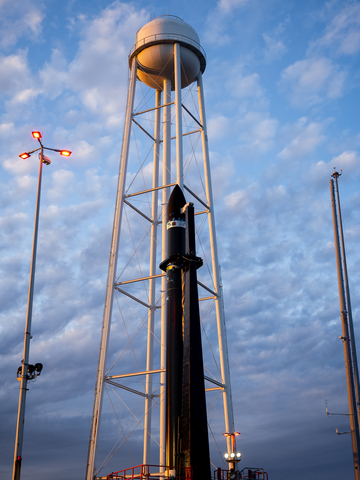U.S. Space Force Awards Rocket Lab Launch Contract for Space Test Program (STP)-S30
- None.
- None.
Insights
The recent contract awarded to Rocket Lab by the U.S. Space Force signifies a notable advancement in the aerospace sector, particularly in the realm of small satellite launches. The Electron rocket's increasing utilization for government payloads demonstrates its reliability and the growing dependence on private companies for space missions. The dedicated launch pad at Virginia's Mid-Atlantic Regional Spaceport indicates a strategic positioning to support frequent and responsive launches, which is important for defense and research missions requiring specific orbital parameters.
Furthermore, the DISKSat's mission to sustain very low earth orbit (VLEO) flight could represent a significant technological leap. The unique disk-shaped satellite bus design may lead to enhanced satellite lifespan and functionality, which in turn could influence satellite design standards and operational strategies within the industry. This has the potential to open up new markets and applications for satellite-based services, impacting the broader aerospace industry and its stakeholders.
Rocket Lab's partnership with the U.S. Space Force for the STP-S30 mission underlines the strategic importance of the private sector in national security operations. The focus on delivering research experiments and technology demonstrations to orbit aligns with the U.S. Department of Defense's objectives to maintain technological superiority in space. The Electron platform's proven track record with the DoD, as evidenced by past successful launches, builds confidence in the vehicle's capabilities to support future space systems development.
The investment in Rocket Lab also reflects a trend towards diversifying launch capabilities and ensuring resilient space access, which is a key concern for defense stakeholders. By fostering innovation through contracts like these, the Space Force is not only enhancing current capabilities but also seeding future advancements in space technology that could have implications for security, surveillance and communications.
Rocket Lab's receipt of the $14.49 million task order from the U.S. Space Force is a positive indicator for the company's financial health and future revenue streams. This contract, along with the ongoing development of the Neutron vehicle supported by a separate $24.35 million contract, suggests a solidifying relationship with the U.S. government, which could provide a stable pipeline of contracts. Such government contracts are typically viewed favorably by investors due to their long-term nature and potential for follow-on orders.
For the broader market, Rocket Lab's success may trigger increased investor interest in the small launch vehicle segment, potentially leading to more capital inflow and innovation. However, investors will be mindful of the competitive landscape and will track Rocket Lab's performance and execution of the STP-S30 mission closely, as it may impact the company's market share and influence its stock valuation.
The mission will be Rocket Lab’s third for the

Electron at Launch Complex 2 at the Mid-Atlantic Regional Spaceport within NASA Wallops Flight Facility in
The dedicated Electron launch is scheduled to take place within 24 months from contract award and will lift off from Launch Complex 2, a dedicated pad for the Electron rocket at Virginia Spaceport Authority’s Mid-Atlantic Regional Spaceport within the NASA Wallops Flight Facility on Virginia’s Eastern Shore. STP-S30 is a complex mission that will deliver research experiments and technology demonstrations to orbit for the DoD and contribute to future space systems development. The projected primary payload, DISKSat, will demonstrate sustained very low earth orbit (VLEO) flight and test a unique, 1-meter diameter, disk-shaped satellite bus that is designed to increase on-orbit persistence.
"Flexible, responsive, and reliable launch is critical to ensuring resilient space capabilities for the nation and we’re proud to deliver it to the Space Force once again with Electron,” said Rocket Lab founder and CEO Peter Beck. “After more than 40 successful launches from pads spanning both hemispheres, we’ve delivered time and time again for DoD, national security, and commercial space users alike, cementing Electron’s position as the leading small launch solution globally. We’re excited to demonstrate this unique combination of mature proven execution, speed, and agility for STP-S30.”
Rocket Lab has a long track record of delivering mission success for the USSF on Electron, including the successful launch of an Air Force Research Laboratory-sponsored demonstration satellite called Monolith in 2021, and the successful launch of the STP-27RD mission research and development satellites for the DoD in 2019. Rocket Lab is also working closely with the USSF for the development of the Company’s new medium-lift vehicle Neutron through a
About Rocket Lab
Founded in 2006, Rocket Lab is an end-to-end space company with an established track record of mission success. We deliver reliable launch services, satellite manufacture, spacecraft components, and on-orbit management solutions that make it faster, easier, and more affordable to access space. Headquartered in
Forward-Looking Statements
This press release contains forward-looking statements within the meaning of the Private Securities Litigation Reform Act of 1995. We intend such forward-looking statements to be covered by the safe harbor provisions for forward looking statements contained in Section 27A of the Securities Act of 1933, as amended (the “Securities Act”) and Section 21E of the Securities Exchange Act of 1934, as amended (the “Exchange Act”). All statements contained in this press release other than statements of historical fact, including, without limitation, statements regarding our launch and space systems operations, launch schedule and window, safe and repeatable access to space, Neutron development, operational expansion and business strategy are forward-looking statements. The words “believe,” “may,” “will,” “estimate,” “potential,” “continue,” “anticipate,” “intend,” “expect,” “strategy,” “future,” “could,” “would,” “project,” “plan,” “target,” and similar expressions are intended to identify forward-looking statements, though not all forward-looking statements use these words or expressions. These statements are neither promises nor guarantees, but involve known and unknown risks, uncertainties and other important factors that may cause our actual results, performance or achievements to be materially different from any future results, performance or achievements expressed or implied by the forward-looking statements, including but not limited to the factors, risks and uncertainties included in our Annual Report on Form 10-K for the fiscal year ended December 31, 2023, as such factors may be updated from time to time in our other filings with the Securities and Exchange Commission (the “SEC”), accessible on the SEC’s website at www.sec.gov and the Investor Relations section of our website at www.rocketlabusa.com, which could cause our actual results to differ materially from those indicated by the forward-looking statements made in this press release. Any such forward-looking statements represent management’s estimates as of the date of this press release. While we may elect to update such forward-looking statements at some point in the future, we disclaim any obligation to do so, even if subsequent events cause our views to change.
View source version on businesswire.com: https://www.businesswire.com/news/home/20240408470615/en/
Rocket Lab Media Contact
Morgan Bailey
media@rocketlabusa.com
Source: Rocket Lab USA, Inc.






